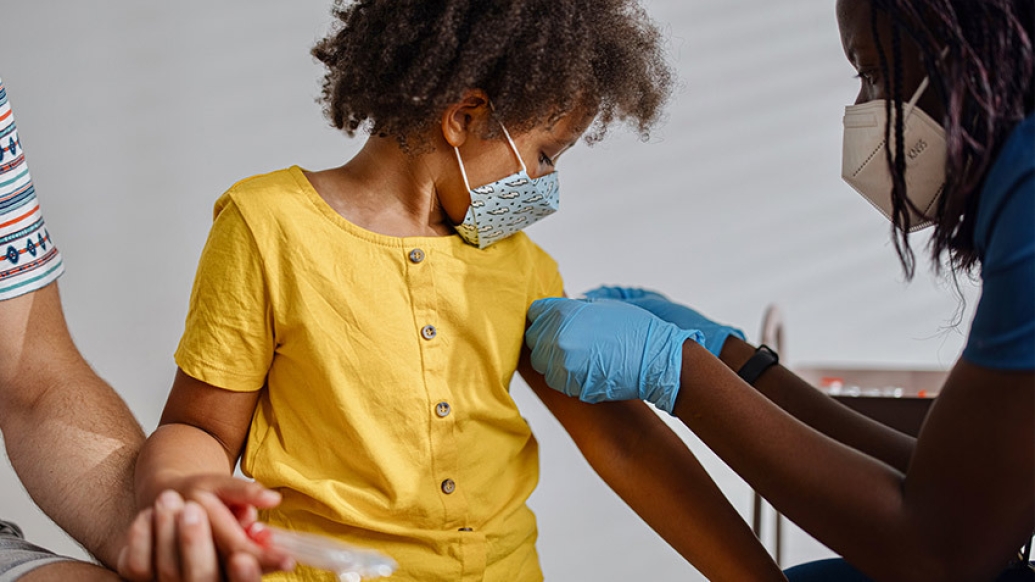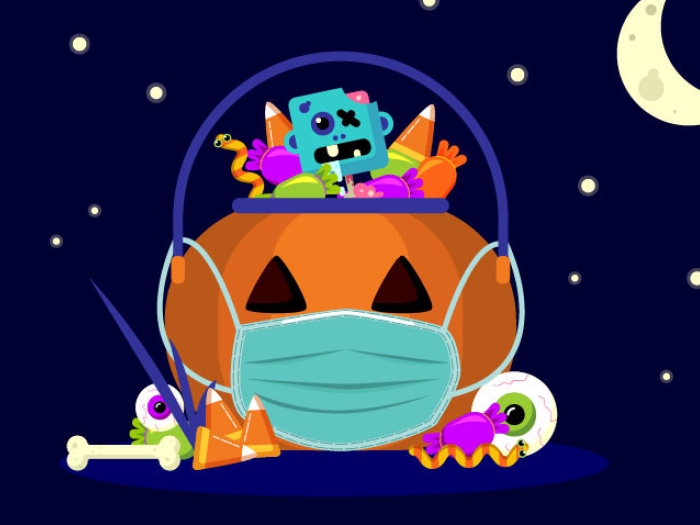Use these tips from a child life specialist to help make sure your child’s COVID vaccine appointment goes smoothly.
9:48 AM
Author |

The pandemic has been extremely disruptive for everyone the past 19 months – especially kids. From missed days of school to the avoidance of indoor establishments such as restaurants and indoor playgrounds, it's fair to say they're ready for a change.
Luckily, the COVID-19 vaccine will soon be available for children ages 5-11. And while many parents are eager for this highly anticipated protection against the novel coronavirus, it can also bring a great deal of anxiety to children who may be afraid of needles.
In addition to planning the logistics of when and where your child will receive their vaccine, you can start preparing by talking to your child now about what to expect.
The first question most parents have when it comes to their child getting a shot is: When do I tell them?
"You can start talking to your child about an upcoming vaccine probably a week or so in advance," said Mary Rumple CCLS, CEIM, child life specialist at University of Michigan Health C.S. Mott Children. "Some say you can use the model of one day per year of age, but a week seems fair for this age group of 5-11."
Rumple adds the caveat that you know your child best. Some may require more or less time to prepare.
The most important thing is that you don't neglect telling them in advance to avoid a negative reaction. This is a normal response, and your child is expressing a feeling. That's okay!
Rumple shares the following steps in how to best prepare your child for a COVID vaccine along with helpful tips for how to have these conversations.
5 expert tips for getting kids prepared to get a shot
1. Ask how your child feels about getting the COVID vaccine, and what they already know
Start your conversation with questions. Your child may not offer their thoughts or feelings without being prompted, and this gives you the chance to hear what your child may already know about the vaccine.
And make sure when you start the conversation that you have enough time and space to allow it to go as you need it to go.
Avoid bringing up the topic on the way to a soccer game where you may be cut short or if your child is hungry or tired. Timing can really matter in helping your child process this information so make sure you have the time and patience to hear your child's feelings.
SEE ALSO: 6 Simple Ways to Ease Children's Fears at the Doctor
Then, most importantly, listen to what your child has to say without judgment. Don't blow off statements like "needles are scary" or use phrases like, "It's no big deal. You'll be fine." This may seem like you're trying to reassure your child but, really, it may make your child think their feelings are wrong. Hear your child out and try responding by acknowledging these feelings.
"You may want to say things like, 'it's okay to feel worried about it. A lot of people do. All feelings are okay. It's my job to be here to help you be more comfortable,'" said Rumple. "Validate feelings and make a plan so your child feels supported."
Like Podcasts? Add the Michigan Medicine News Break on iTunes, Google Podcasts or anywhere you listen to podcasts.
Fear of needles or vaccines is normal at any age. Allow your child to express their feelings even if they're mad, sad or tearful. They will be more open to your support if their feelings are being heard.
And during the conversation it's important to remain calm. If you're feeling anxious, your child will feel anxious.
Tip: Avoid talking about your own, or others', bad experiences with needles. This can add to the fear or anxiety your child may be feeling.
2. Inform your child of the details
Think logistical details. What is going to happen? Where will you go?
Be detailed so the child can visualize the experience ahead of time. Think about what they will see, hear and feel.
"Walk your child through the play-by-play of what to expect," said Rumple. "First, we'll check in with a helper who will ask for your name. Then they may ask us to sit and wait. When it's our turn, we'll meet our nurse and she'll show us where we can sit. The nurse will wash an area of your arm to make sure there are no germs. This may feel cold and the wipe might smell like hand sanitizer. Next, you'll get your vaccine through a small poke – you may feel a little pressure or pinch, but it will be quick! Then, you'll get a Band-Aid and it's all done."
Tip: Use kid-friendly language by choosing words like "vaccine" or "immunization" instead of "shot." This is helpful because the word "shot" may have negative associations, either from past experiences or from confusion around the more violent definition of that word. You can also describe the feeling as a "pinch," "pressure" or "small poke" instead of words like "sting" or "burn." And, finally, refer to nurses and staff as "helpers" to make a connection that they're there to help them receive their vaccine, not hurt them with a needle.
3. Address why you're getting the COVID vaccine
Be concise and keep it simple.
"The child life team likes to describe a vaccine as a superhero shield to protect us from sickness caused by germs," said Rumple. "The vaccine will teach your body to fight against COVID germs to keep you safe and healthy."
Most children have received other vaccines. It may be helpful to reference they've had these before so it doesn't feel new and scary.
Tip: Talk about the vaccine in a positive way. Focus on how they're doing something for the greater good. By keeping their body protected against COVID, they are also helping keep friends, family, teachers, and others in our community safe.
4. Make a plan for the day-of
Be sure to do this together and give simple choices. Honor your child's need for control.
Here are some helpful questions you can ask your child to prepare them for getting a vaccine:
-
Do you want to watch the poke?
-
Would you like to sit on my lap or hold my hand?
-
Do you want to count down or ask the nurse to count?
-
What could we do before and/or during the vaccine?
Here are some distraction ideas to help your child relax while at your vaccination appointment:
-
Cuddle a stuffed animal
-
Squeeze a hand (or stress ball)
-
Listen to music
-
Watch a video
-
Breathe deeply
-
Think of a place that makes you happy and pretend you are there
-
Count numbers
-
Read a book
-
Tell a story
-
Hold a light spinner
Your child may also benefit from comfort positions to help them feel safe and more in control. This can help decrease anxiety, creating a more positive experience.
Tip: If you're able to, agree on something enjoyable to do after your appointment like going to a park. This isn't intended to be treated as a reward for being good or something to take away if they struggle, it's to serve as another distraction and give your child something positive to focus on during the poke.
5. Practice
For younger children, let them play it out. Rehearse the vaccination through play by using a toy syringe on a stuffed animal. Reinforce the steps you talked about previously and then ask them what would make their stuffed animal feel better. Perhaps it's the same distraction or relaxation technique your child decides to use for themself.
SEE ALSO: Try These 3 'Comfort Positions' at Your Child's Next Checkup
This process helps your child feel more in control and it may be something you want to do several times before the appointment.
Tip: For older kids, just check in. If you started the conversation a week in advance, check in a few days before the vaccine and ask how they're feeling about it. Do they still feel good about the plan? If they need to say, "I hate this" again, that's okay.
Don't forget to praise your child
When the shot is over, don't forget to give your child lots of praise. This is something that felt hard to do and they did it. That should be celebrated.
Compliment them on the hug they gave you during the shot, or on staying still or doing great breathwork.
By praising your child, you're reinforcing the positive behaviors, and setting your child up for more success the next time they need a vaccine.

Explore a variety of healthcare news & stories by visiting the Health Lab home page for more articles.

Department of Communication at Michigan Medicine
Want top health & research news weekly? Sign up for Health Lab’s newsletters today!





